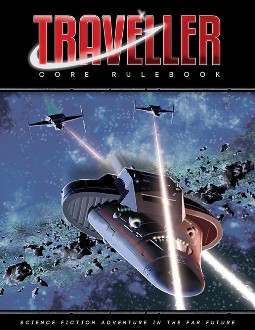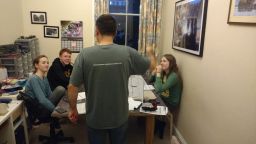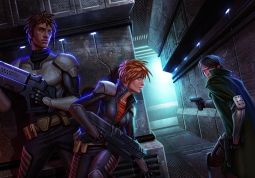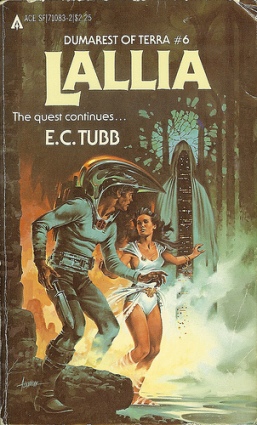Modular: The New Mongoose Traveller #3 — Random Adventures, Or How I GM’d With No Prep

Spacers in Ganelon Navy uniforms cram the bar. These guys have a reputation for trashing bars and brawling with strangers. However, this evening, they are beyond well behaved. They keep their hands off the waiting staff, even tip them generously. They are almost painfully polite — “I’m sorry I nearly jostled you! Please accept my apologies, and further apologies on behalf of my ship and indeed my culture…”
This is a problem!
Or at least a problem for the three hard-up traveling companions huddled around a small corner table… let’s call them Travellers... sipping beer from bulbs designed to cope with the 0.15G (these are real!). They have a contract to catch the Ganelon spacers behaving badly so as to compromise that star kingdom’s naval goodwill tour. So far, they are not seeing any bad behaviour.
Somewhat direct in mentality, Charadack, the retired marine sergeant in the group, starts loudly boasting about a battle in which the Imperium forces utterly thrashed those of Ganelon Star Kingdom. Perhaps he can provoke an assault?
After about fifteen minutes, a Ganelon officer carefully navigates the crowded bar and addresses Charadack: “I hear you are talking about your great victory. May I compliment you and the entire Imperium for your chivalry? You are brave and noble fighters, and indeed were exceptionally polite and gracious to the POWs captured as a result of your glorious success…”
At this point, our Travellers are starting to freak out. What is going on?
However, Gwen, a technically minded former navy pilot, notices that the Ganelon officer and all his men wear small communicator badges that are live-streaming back to their warship. The reason these rough-tough wildboys are acting so house-trained is because somebody more senior is watching their every move in real-time.
Now, Castelveras, the third Traveller, something of a career criminal, decides to step up. He pats the retired sergeant’s head. “Sorry about our android! He’s just a bit too convincing. He’s actually literally a work of art…”
This is not entirely insane because Clifford’s Bane is a third generation artists’ colony. Though the tiny community is riven by factions, it’s still best known for the wonderful artistic works created in the pressurised ancient alien caverns that serve as home to the several hundred people making up the permanent population.
It also helps that the Castelveras is very convincing.
“Really?” says the Ganelon officer, genuinely intrigued. ” A robot?”
“Yes,” says Castelveras, “let me buy you a drink to make up for his poor programming…” Perhaps he can find a way to remove the monitors…?
Everything goes fine, until the retired marine sergeant begins to visibly perspire. You see, androids don’t sweat…

…and you had to be there, around my son’s 6 x 4 gaming table, on an autumnal Edinburgh Friday night.
I was a little nervous about GMing this group of 13 and 14 year-olds. On the one hand, they’re all clued up and genre savvy — all watched Firefly, one had read Dune, all products of SF geek families. On the other hand, the fathers of both my son’s friends were experienced Traveller referees. One even has a very nice tabletop RPG blog (Hello, Brian!).
I hadn’t prepared in detail. Instead, I was going to wing it using the sandbox setting Kurtzhau (my son) and I created, largely randomly, plus the random tables. This is pretty much how Marc Miller is supposed to have refereed back in the day. (However, if you want to know for sure, go back the book of reminiscences by one of his co-designers.)
On the face of it, it seems a slightly bonkers idea. Traveller sometimes makes me feel like my high school physics teacher is going to beat down the door, wave a gauss rifle in my face and demand to see my workings! Even so, it worked like a dream and we had a rollicking good evening. The boys barely even noticed that their PCs didn’t kill anybody… this time!

It worked because of the game and the players.
Traveller in all its incarnations has the conflict baked in. For example, the more powerful the weapon, the greater the issues with the local law, the greater its rarity. You could have several sessions focused just on sourcing then transporting a fusion gun, for example. The whole thing is one vast sack of adventure seeds.
In the case of our evening’s play, just the randomly generated world alone would have sparked some interesting adventures. The whole concept of an artists’ colony on a moon came from getting “Art” as a cultural quirk. That easily gave agendas to the randomly generated local factions — the reactionary artists who like the status quo, and the hereditary assistant class, who want to develop the space port and tourism. Oh and to add pressure, the colony’s tech level is not high enough for them to maintain their own life support, let alone the grav plates. And did I mention rumours of pirates? (Also randomly generated).
Then there was the adventure. I literally turned to page 88 of the Traveller Core Rulebook and started rolling pairs of dice. I got: Patron (33) “A spy”; Mission (22) “Discredit a target”; and Target (66) “Warship”.
Given I already had the setting, it was easy — and great fun — to come up with the details on the fly. I was particularly proud of the Ganelon “barbarians” with their live-streaming life-loggers…
In fact, any of the combinations would have worked!
Perhaps a “Tribal Leader” wanted the Travellers to “Aid in a burglary” involving a “Yacht”?
Already your mind is revving, right?

Two things are going on. First, it’s just easier to solve problems and make connections than invent plot in a vacuum. Second, the random mission tables are as well thought-out and as all-inclusive as a Tarot deck.
Then there’s the thing with the players.
They were very proactive and quick off the mark. The evening would have been a total flop had they had a more passive play style. A lot of this was down to them feeling at home with the setting and themes.
The teens, though just teens, were also very much urban teens who’ve watched movies and played video games they probably weren’t supposed to. There were lots of throw-away references to Halo, Mass Effect and Alien. The seedy Traveller universe of dodgy bars and dodgier people was nothing new to them.
They even took a malicious glee in playing what one indelicately called, “middle-aged screw-ups”. (I should note that they also found the character generation mini-game… educational, especially when one character flunked college, so the discomfort worked both ways.) Any of the three could have refereed successfully — as Kurtzhau actually did a couple of months back. However, I am not sure I would want to be in the room when it happened. They grow up fast.
I don’t think these young adults are unique.
When it came out, Traveller tapped into an influential though nameless subgenre (I call it Space Punk). In the last four decades, partly due to the game itself, that subgenre’s tropes have become familiar not just for video games, but also for the screen, small and big. When I first touted an assault rifle around Halo’s mysterious alien ruins, it felt like coming home. And then there’s Firefly and Elite Dangerous…
Young people also mentally inhabit a far more Traveller-like world than they did four decades ago. They are digital natives and accustomed to our imperfectly distributed future in which a rice farmer might take a break from leading a bullock around her paddy field in order to check the weather forecast on her smart phone, and notice men on horses riding past brandishing assault rifles. And, thanks to increasingly gritty modern thriller movies like the Bourne series, “abroad” is no longer an unchanging never-never land or a series of glamorous locations.
Finally, we come to the “middle-aged screw-ups”. Compared to my generation, young people are far, far more aware that they have a life path ahead of them, that it’s precarious, and requires some strategic thinking. They’ve swapped “I hope I die before I get old” for “I hope I’m not still working when I get old”. They also, thanks to the kind of books they read, and to soap operas and TV shows in general, are aware of middle age as a condition. To Stranger Things era teens, Traveller‘s notorious character generation mini-game and aging rules were quaintly amusing. To today’s teens, they are wryly amusing and perhaps a bit cathartic.
All this suggests to me that Traveller’s is more, rather than less, relevant than when it came out.
M Harold Page is the Scottish author of The Wreck of the Marissa (Book 1 of the Eternal Dome of the Unknowable Series), an old-school space adventure yarn about a retired mercenary-turned-archaeologist dealing with “local difficulties” as he pursues his quest across the galaxy. His other titles include Swords vs Tanks (Charles Stross: “Holy ****!”) and Storyteller Tools: Outline from vision to finished novel without losing the magic. (Ken MacLeod: “…very useful in getting from ideas etc to plot and story.” Hannu Rajaniemi: “…find myself to coming back to [this] book in the early stages.”)
Have you read Paul Elliott’s Ancient Roman hack for classic Traveller? It’s called Mercator. There’s a link on this page: http://www.paulelliottbooks.com/free-rpgs.html
Yes sorely tempted to play it!
Yeah this is a great way to low prep.
Have you played any of the Sine Nomine Publishing games like Stars Without Number? They come with lots of GM low prep help, generating random things, places, people, factions etc, and are pretty good. https://www.drivethrurpg.com/product/226996/Stars-Without-Number-Revised-Edition
I also use story cubes a lot. https://www.storycubes.com/
I haven’t ever run a D20 system, but I have read an older version of Stars Without Number and was impressed by the way it treats factions as characters.